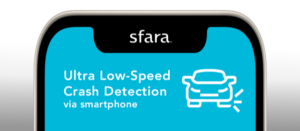
CCC, Sfara announce deal to help insurers connect crash data to claims
By onAnnouncements
CCC Intelligent Solutions and mobile safety solutions provider Sfara, which specializes in smartphone-based collision data technology, have announced that they will work together to accelerate the claims management process for their insurance customers.
Customers will be able to “seamlessly connect” Sfara’s mobile crash detection data with CCC’s claims management solutions, accelerating claims outcomes, according to a joint news release.
Under the agreement, CCC will take in Sfara’s accident data via the CCC Cloud, including such elements as point of impact, direction of force, and other pertinent telematics data. Insurers can then leverage that data through CCC’s software-driven workflows for auto physical damage and casualty claims.
The data will support “the customer’s ability to estimate damage severity, schedule timely repairs, and beyond, creating more straight-through experiences for drivers and insurers,” the companies said. They added that the accident data could also be useful in flagging potential fraud, and in crash reconstruction.
Sfara touts the ability of its artificial intelligence-based algorithms to detect collisions at low speeds, with a low rate of false positives. Competitor technologies typically work best at higher speeds, where vehicles tend to experience a total loss, “so there is no way to orchestrate the repair experience for a customer or take advantage of post collision economics,” it says.
The company points out that 70% of insurance claims are from accidents at low speeds. “If you don’t want to miss the majority of incidents, you must reliably detect incidents in the lower speed bands,” it says.
“Working with CCC will help us seamlessly pass this timely, comprehensive view of an auto accident to the insurance industry at scale, enabling insurers to initiate and inform a number of activities and decisions across the claims process,” Sfara CEO Erik Goldman said in a statement.
Marc Fredman, CCC chief strategy officer, said, “Understanding the facts of an accident immediately following the event can help insurers make more timely decisions that ultimately impact policyholder satisfaction and claims costs. Sfara is a proven provider of collision detection services. We’re excited to welcome them to CCC’s network and we look forward to helping our shared customers seamlessly apply accident intelligence throughout their claims processes, advancing their efforts to achieve straight-through processing.”
From a repairer perspective, “access to more and earlier information about the accident could have a positive impact on cycle time, efficiency and customer satisfaction,” Michelle Hellyar, CCC’s director of public relations, told Repairer Driven News. “Total vs. repair decisions can be made earlier by insurers, helping to limit total losses being routed to shops. Repairs could be scheduled digitally; repair planning could begin earlier and the essential parts to repair the vehicle could be ordered before a car even arrives at the shop.
“These choices can be measured within minutes of the accident rather than in days. As a result, unnecessary time and expenses associated with multiple tows and storage can be minimized,” she said.
Rocco Tricarico, CMO of Sfara, told RDN that “Sfara’s technology, made widely available to the market just this year, is currently deployed within the Automotive sector, Fleet Telematics space and with several Fortune 500 companies. Additionally, our latest generation technology is being evaluated by several Insurance Carriers and Consumer Safety companies.”
Tricarico said the company’s core technologies, and pre-integrated solutions from its partners, are being used by clients in 48 countries with availability in 18 languages.
Sfara says that its low-speed crash detection gives “relevant companies” the opportunity “to offer white-glove services and control the post-collision response and repair experience. This includes avoiding double towing fees, keeping the vehicle in-network, and getting it repaired at Direct Repair Shops (DRPs), while also controlling parts and costs.”
For carriers, Sfara’s technologies provide two valuable forms of first notice of loss (FNOL), on-scene and automatic.
On-scene FNOL currently occurs in only 12% of incidents, Sfara said in a November 2021 press release. “Considering that insurers stand to gain up to $800 for each on-scene response that provides emergency services and in-network towing to Direct Repair Shops (DRPs), the potential for economic growth to insurers is enormous.”
During the December rollout of Sfara’s low-speed crash detection product, Tricarico said, “With outreach programs, automotive OEMs outfitting their customers with Sfara’s crash detection can expect to see an increase of vehicles in their service bays from collisions that might not otherwise have been reported or serviced in authorized dealerships.”
Sfara described its potential clientele in a recent blog post: “Industries awaiting change include insurance carriers who want claims automation, automotive OEMs who want to control post collision economics, and fleets who want better data on damage inflicted at lower speeds. All these hopes require sophisticated impact detection and false positive suppression, enveloped in technological and methodological advancements designed to meet the unique needs of an enterprise program.”
Images
Featured image provided by Sfara
